必修三第五单元单元小结
- 格式:ppt
- 大小:333.50 KB
- 文档页数:27

重点单词〉重点短语5重点句型重点语法〉>功能A■单元重点小结1.baggage〃•行令t luggnge 〃•侗义词)2.eastward加认向东•向东的;朝东的―>east n冻方3.surround必包围:围绕—> surroundings 门•周围的事物:环境t surrounding a©・周围的4.slight 轻微的;微小的—slightly a dv.稍稍:轻微地5.mix vt.&vi.混合,调配—> mixture n.混合(物):混合状态6.wealthy a〃・富有的—wealth"•财富17.distance门・距离;远方—distant a©.遥远的8.tradition门•传统:风俗t traditional如/・传统的—adv.传统地itionally9.terrify _____ i/t •使恐怖;恐吓-> terrified adj.恐惧的;受惊吓的-> teirifying a"•令人恐惧的10.impress _____ 讥•使印象深刻;使铭记—> impression n.印象f impressive 日©・给人深刻印象的;感人的1.去往某地旅游 ________2 •与其;不愿__________3•被 . 环绕be surrounded by _____4.定居;平静下来;专心于 ___ settle clown ______ 5•设法做 _____6•看见;瞥见 ______7•对 . 有天赋have a gift for8•在远处in the distance________9•在黎明时候 ____ a t dawn__________1・她们不想一路乘飞机,而决定先飞到温哥华,再从西海岸乘火车横穿加拿大到达东海岸。
Rather than take the aeroplnne all the way,they decided to fly to Vancouver and then take the train from west to east across Canada・2•那里的湿度很大,所以树都长得特别高,一些高达90多米。
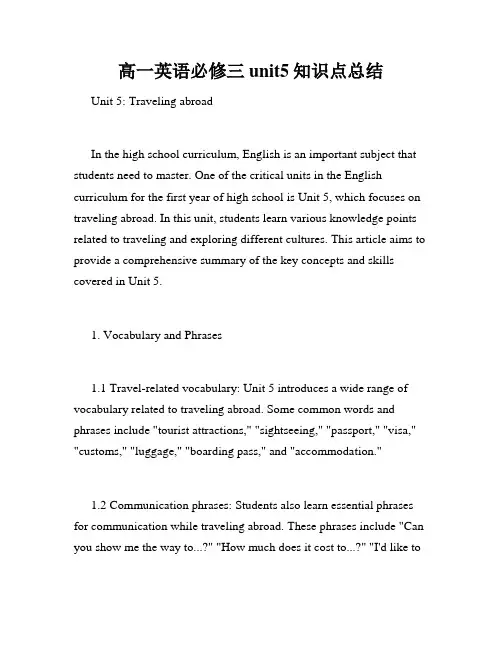
高一英语必修三unit5知识点总结Unit 5: Traveling abroadIn the high school curriculum, English is an important subject that students need to master. One of the critical units in the English curriculum for the first year of high school is Unit 5, which focuses on traveling abroad. In this unit, students learn various knowledge points related to traveling and exploring different cultures. This article aims to provide a comprehensive summary of the key concepts and skills covered in Unit 5.1. Vocabulary and Phrases1.1 Travel-related vocabulary: Unit 5 introduces a wide range of vocabulary related to traveling abroad. Some common words and phrases include "tourist attractions," "sightseeing," "passport," "visa," "customs," "luggage," "boarding pass," and "accommodation."1.2 Communication phrases: Students also learn essential phrases for communication while traveling abroad. These phrases include "Can you show me the way to...?" "How much does it cost to...?" "I'd like tobook a hotel room for two nights," and "Where can I exchange currency?"1.3 Transportation vocabulary: Unit 5 covers transportation-related vocabulary essential for traveling, such as "airfare," "departures," "arrivals," "delay," "terminal," "platform," and "check-in."2. Grammar Points2.1 Modal verbs: Students learn about the use of modal verbs, such as "can," "could," "may," and "might," to express ability, permission, and possibility. They practice constructing sentences using these modal verbs appropriately.2.2 Conditional sentences: Unit 5 introduces conditional sentences, including the first and second conditional. Students learn to form conditional statements using "if" and understand how to express hypothetical situations and their possible outcomes.2.3 Passive voice: Students are introduced to the concept of passive voice and its usage in English. They learn to convert active sentencesinto passive ones and vice versa. Additionally, they practice using the passive voice to describe processes and events.3. Reading and Writing Skills3.1 Reading comprehension: Unit 5 provides students with reading passages related to various travel destinations. Through these passages, students develop their reading skills, such as scanning for specific information, understanding main ideas, and inferring meanings from context.3.2 Writing tasks: Students practice writing different types of texts related to travel, including emails, postcards, and travel blogs. They learn to structure their writing appropriately, use appropriate vocabulary and grammar, and convey their experiences and opinions effectively.4. Listening and Speaking Skills4.1 Listening comprehension: Students improve their listening skills through audio recordings of conversations, interviews, and travelannouncements. They learn to grasp the main ideas, understand specific details, and follow instructions accurately.4.2 Speaking activities: Unit 5 includes various speaking activities where students engage in conversations, discussions, and role-plays related to traveling abroad. These activities help students develop their fluency, pronunciation, and ability to express their thoughts and preferences.5. Cultural AwarenessUnit 5 aims to cultivate students' cultural awareness and sensitivity while traveling abroad. Students learn about cultural differences, customs, and etiquette in different countries. They are encouraged to respect and appreciate diverse cultures and to approach new experiences with an open mind.In conclusion, Unit 5 of the high school English curriculum focuses on traveling abroad. It covers a wide range of vocabulary, grammar points, reading and writing skills, listening and speaking activities, and cultural awareness. By studying this unit, students will gain the necessary knowledge and skills to navigate different cultures and enhance their overall language proficiency.。
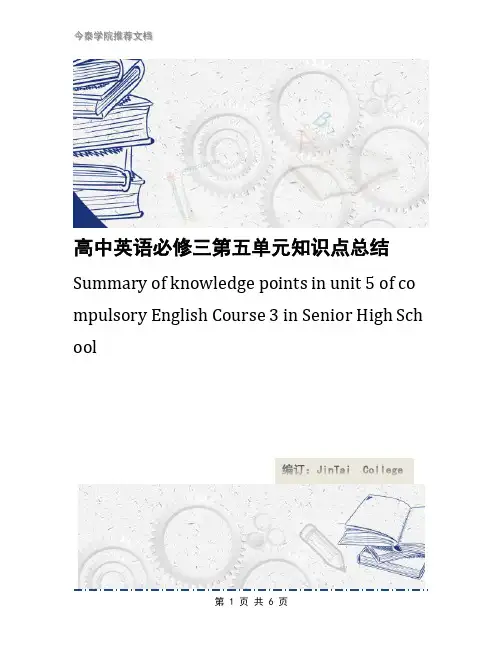
高中英语必修三第五单元知识点总结Summary of knowledge points in unit 5 of co mpulsory English Course 3 in Senior High Sch ool高中英语必修三第五单元知识点总结前言:小泰温馨提醒,英语作为在许多国际组织或者会议上都是必需语言,几乎所有学校选择英语作为其主要或唯一的外语必修课。
英语教学涉及多种专业理论知识,包括语言学、第二语言习得、词汇学、句法学、文体学、语料库理论、认知心理学等内容。
本教案根据英语课程标准的要求和针对教学对象是高中生群体的特点,将教学诸要素有序安排,确定合适的教学方案的设想和计划、并以启迪发展学生智力为根本目的。
便于学习和使用,本文下载后内容可随意修改调整及打印。
表示“使糊涂,搞乱,混淆”。
confuse a and/with b把a误认为是b。
形容词confused表示“糊涂的,混杂的”。
2)coast表示“海岸,滑坡”。
the coast in clear是一习惯用语,表示“没有被发现或者被捉住的危险”。
3)settle down表示“定居,平静下来,专心于,舒适地躺着或者坐着”。
有关settle的词组:settle on sth决定做某事 settle sth on sb将……转让给某人 settle for sth勉强认可某事settle one’s/an account(with sb)为受到的伤害,侮辱等,复仇。
4)have a gift for表示“对……有天赋”。
形容词gifted表示“有天赋的”。
be gifted at/in表示“对……有天赋”。
gift也可表示“礼物”。
5)border作及物动词,表示“与……接壤,给……镶边”。
作不及物动词,后接介词on或upon,表示“邻近,接界,近似,近乎”。
作名词,表示“边界,国界”。
指具体的边界线或边界线内的一带地方。
还表示“在……的边缘,正要,将要”。
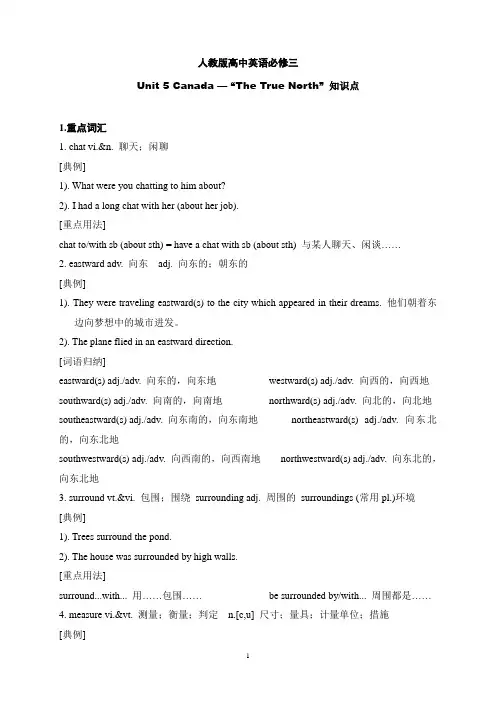
人教版高中英语必修三Unit 5 Canada —“The True North”知识点1.重点词汇1. chat vi.&n. 聊天;闲聊[典例]1). What were you chatting to him about?2). I had a long chat with her (about her job).[重点用法]chat to/with sb (about sth) = have a chat with sb (about sth) 与某人聊天、闲谈……2. eastward adv. 向东adj. 向东的;朝东的[典例]1). They were traveling eastward(s) to the city which appeared in their dreams. 他们朝着东边向梦想中的城市进发。
2). The plane flied in an eastward direction.[词语归纳]eastward(s) adj./adv. 向东的,向东地westward(s) adj./adv. 向西的,向西地southward(s) adj./adv. 向南的,向南地northward(s) adj./adv. 向北的,向北地southeastward(s) adj./adv. 向东南的,向东南地northeastward(s) adj./adv. 向东北的,向东北地southwestward(s) adj./adv. 向西南的,向西南地northwestward(s) adj./adv. 向东北的,向东北地3. surround vt.&vi. 包围;围绕surrounding adj. 周围的surroundings (常用pl.)环境[典例]1). Trees surround the pond.2). The house was surrounded by high walls.[重点用法]surround...with... 用……包围…… be surrounded by/with... 周围都是……4. measure vi.&vt. 测量;衡量;判定n.[c,u] 尺寸;量具;计量单位;措施[典例]1。
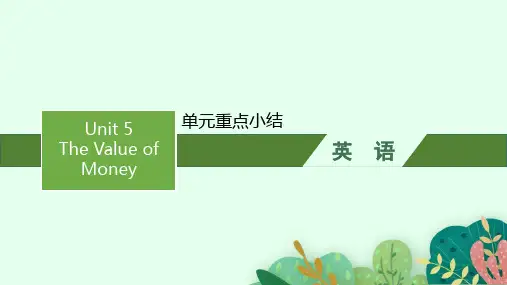

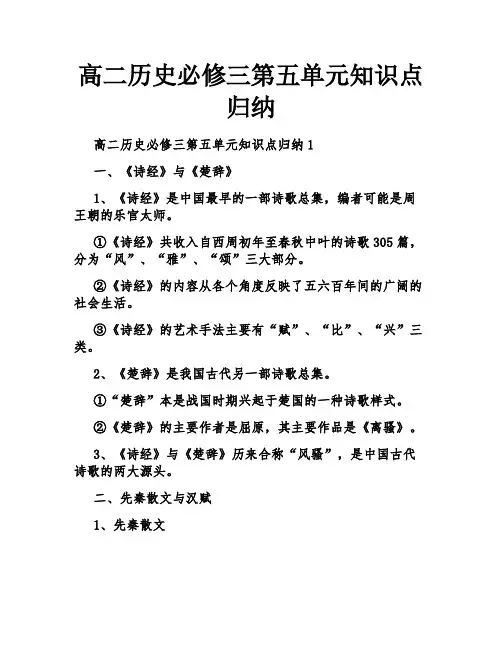
高二历史必修三第五单元知识点归纳高二历史必修三第五单元知识点归纳1一、《诗经》与《楚辞》1、《诗经》是中国最早的一部诗歌总集,编者可能是周王朝的乐官太师。
①《诗经》共收入自西周初年至春秋中叶的诗歌305篇,分为“风”、“雅”、“颂”三大部分。
②《诗经》的内容从各个角度反映了五六百年间的广阔的社会生活。
③《诗经》的艺术手法主要有“赋”、“比”、“兴”三类。
2、《楚辞》是我国古代另一部诗歌总集。
①“楚辞”本是战国时期兴起于楚国的一种诗歌样式。
②《楚辞》的主要作者是屈原,其主要作品是《离骚》。
3、《诗经》与《楚辞》历来合称“风骚”,是中国古代诗歌的两大源头。
二、先秦散文与汉赋1、先秦散文①先秦历史散文中,主要有编年体的《左传》、国别体的《国语》、《战国策》、专记个人言行的《晏子春秋》等,其中《左传》的文学成就。
②先秦诸子散文,主要是由“百家争鸣”时期诸子的言论编纂而成,有儒家的《论语》、《孟子》、《荀子》,道家的《老子》、《庄子》,法家的《韩非子》等。
2、汉赋①赋是中国特有的一种文学样式,它兼有散文和韵文的性质,其主要特点是铺陈写物,不歌而诵。
②汉赋按题材取向可分为两大类,一类是抒情述志的短赋,一类是以铺陈排比为主要手法的“体物”大赋。
后者是汉赋的主流。
汉大赋的代表作家是司马相如和杨雄。
汉赋的恢宏气度是汉代自强不息的民族性格和积极乐观的时代精神的艺术体现。
三、唐诗宋词1、唐诗的发展大致可分为四期,即初唐、盛唐、中唐、晚唐。
其中尤以盛唐、中唐两个时期的诗坛最为光辉夺目。
①盛唐诗坛上有以王维、孟浩然为首的山水田园诗派和以高适、岑参为首的边塞诗派,前者是中华民族热爱自然、重视人与自然的和谐关系的民族心理的艺术积淀,后者体现了中华民族热爱和平、反对侵略和不畏强暴的民族性格。
②盛唐气象是富于浪漫气息和理想色彩的精神面貌,在唐诗中盛唐气象最杰出的代表首推诗仙李白。
诗圣杜甫以清醒的洞察力和积极的入世精神,深刻而全面地反映了现实生活。
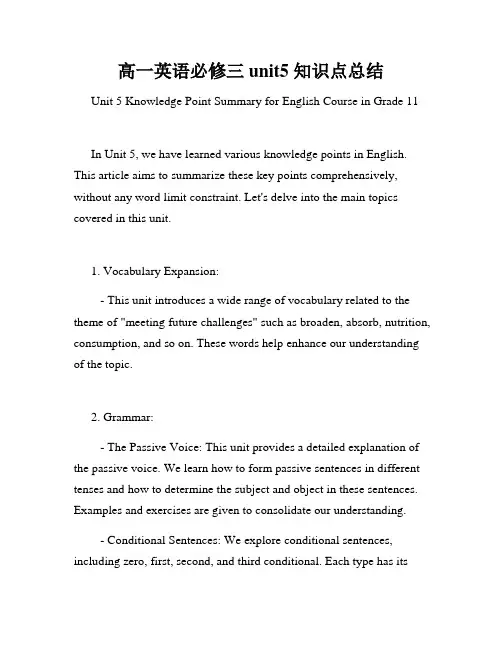
高一英语必修三unit5 知识点总结Unit 5 Knowledge Point Summary for English Course in Grade 11In Unit 5, we have learned various knowledge points in English. This article aims to summarize these key points comprehensively, without any word limit constraint. Let's delve into the main topics covered in this unit.1. Vocabulary Expansion:- This unit introduces a wide range of vocabulary related to the theme of "meeting future challenges" such as broaden, absorb, nutrition, consumption, and so on. These words help enhance our understanding of the topic.2. Grammar:- The Passive Voice: This unit provides a detailed explanation of the passive voice. We learn how to form passive sentences in different tenses and how to determine the subject and object in these sentences. Examples and exercises are given to consolidate our understanding.- Conditional Sentences: We explore conditional sentences, including zero, first, second, and third conditional. Each type has itsown structure and usage. Through practice, we grasp the skills to express conditions and consequences accurately.- Indirect Speech: This section teaches us how to report statements, questions, commands, and requests in indirect speech. We learn the changes in tenses, pronouns, and adverbials when transforming direct speech into indirect speech.3. Reading Comprehension:- We read various texts and passages that discuss challenges in life, technology, and education. By analyzing these texts, we enhance our reading comprehension skills, such as identifying the main idea, understanding the author's tone, and inferring meaning from context.4. Listening Skills:- In this unit, we practice listening to various audio resources, including interviews, academic lectures, and news reports. By listening attentively, we improve our ability to understand spoken English, identify key points, and extract relevant information.5. Writing Skills:- Throughout this unit, we develop our writing skills by composing different types of essays, such as argumentative essays,opinion essays, and descriptive essays. We learn how to structure our writing, present arguments effectively, and use appropriate language to express our ideas.6. Speaking Skills:- The speaking activities in this unit focus on expressing opinions, debating, and discussing future challenges. We enhance our ability to express ourselves clearly, support our arguments, and engage in meaningful conversations with others.7. Cultural Understanding:- Unit 5 also provides opportunities for us to explore cultural differences and perspectives on meeting future challenges. We learn about different cultural approaches to education, technology, and problem-solving, which broadens our global awareness.In conclusion, Unit 5 of the Grade 11 English course covers a wide range of essential knowledge points. By expanding our vocabulary, improving grammar skills, enhancing reading and listening comprehension, and honing writing and speaking abilities, we become more proficient in English and better equipped to face future challenges. Keep practicing and applying what we have learned to master these skills effectively.。
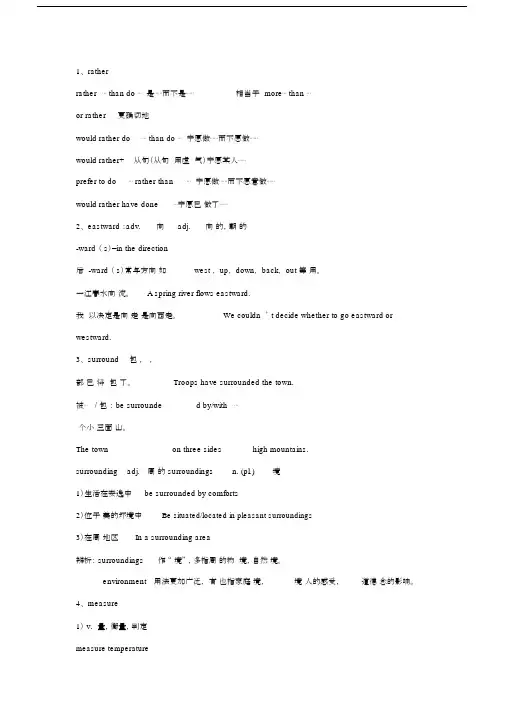
1、 ratherrather⋯than do⋯ 是⋯⋯而不是⋯⋯相当于more⋯than⋯or rather更确切地would rather do⋯than do⋯ 宁愿做⋯⋯而不愿做⋯⋯would rather+从句(从句用虚气)宁愿某人⋯⋯prefer to do⋯rather than⋯ 宁愿做⋯⋯而不愿意做⋯⋯would rather have done⋯宁愿已做了⋯⋯2、 eastward :adv.向adj.向的,朝的-ward ( s)=in the direction后 -ward ( s)常与方向如west , up, down, back, out 等用。
一江春水向流。
A spring river flows eastward.我以决定是向走是向西走。
We couldn ’ t decide whether to go eastward or westward.3、 surround包,,部已将包了。
Troops have surrounded the town.被⋯ / 包: be surrounde d by/with⋯个小三面山。
The town ______ _______ on three sides ______ high mountains.surrounding adj.周的surroundings n. (pl.)境1)生活在安逸中be surrounded by comforts2)位于美的坏境中Be situated/located in pleasant surroundings3)在周地区In a surrounding area辨析: surroundings作“ 境” ,多指周的物境,自然境。
environment用法更加广泛,有也指家庭境,境人的感受,道德念的影响。
4、 measure1) v. 量,衡量,判定measure temperatureWe measured the distance.The room measures 6 meters by 4.个房 6 米, 4 米。
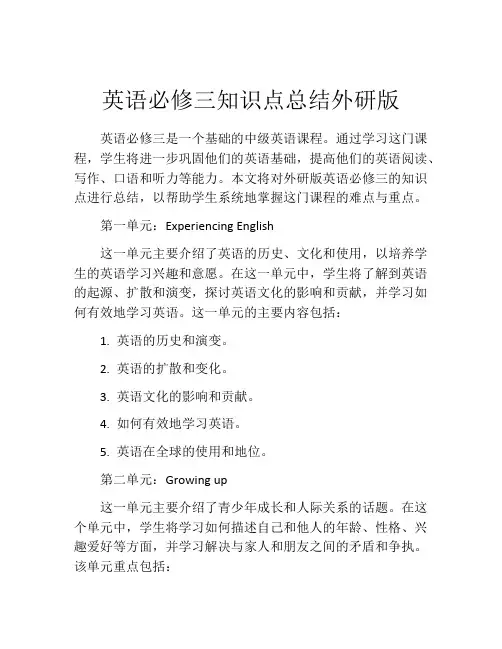
英语必修三知识点总结外研版英语必修三是一个基础的中级英语课程。
通过学习这门课程,学生将进一步巩固他们的英语基础,提高他们的英语阅读、写作、口语和听力等能力。
本文将对外研版英语必修三的知识点进行总结,以帮助学生系统地掌握这门课程的难点与重点。
第一单元:Experiencing English这一单元主要介绍了英语的历史、文化和使用,以培养学生的英语学习兴趣和意愿。
在这一单元中,学生将了解到英语的起源、扩散和演变,探讨英语文化的影响和贡献,并学习如何有效地学习英语。
这一单元的主要内容包括:1. 英语的历史和演变。
2. 英语的扩散和变化。
3. 英语文化的影响和贡献。
4. 如何有效地学习英语。
5. 英语在全球的使用和地位。
第二单元:Growing up这一单元主要介绍了青少年成长和人际关系的话题。
在这个单元中,学生将学习如何描述自己和他人的年龄、性格、兴趣爱好等方面,并学习解决与家人和朋友之间的矛盾和争执。
该单元重点包括:1. 描述人的外貌和性格。
2. 描绘人的兴趣爱好。
3. 解决家庭和朋友之间的矛盾和争执。
4. 描述成长和个人经历。
5. 形容一个课外活动。
第三单元:Travel journal这一单元主要关注旅游和地理方面的话题。
在这个单元中,学生将学习如何描述旅游景点和城市,并学习如何计划旅行和接待外国客人。
该单元重点包括:1. 描绘旅游景点和城市。
2. 计划旅行和接待外国客人。
3. 推荐一个旅游目的地。
4. 讲述一个旅行日记。
5. 描述日常旅行中的经历。
第四单元:Great people and great inventions这一单元介绍了历史人物和发明家的生平故事以及他们的贡献。
在这个单元中,学生将了解到一些伟大人物的生活故事和成就,学习如何描述发明和创新的过程,以及如何进行科学实验。
该单元重点包括:1. 描绘历史人物的生平故事和贡献。
2. 描绘发明和创新的过程。
3. 进行科学实验。
4. 推介一个伟大的发明家或科学家。
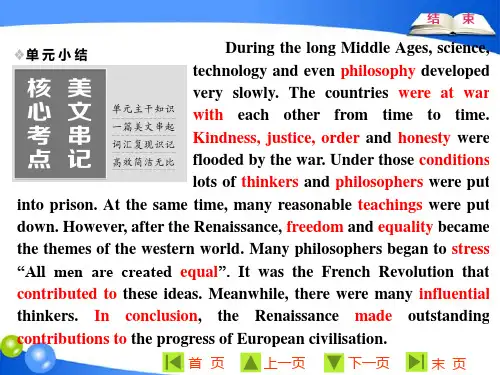
全国通用2023高中英语必修三Unit5TheValueofMoney知识点归纳总结(精华版)单选题1、Leave your key with a neighbour ________ you lock yourself out one day.A.as long asB.so thatC.in caseD.now that答案:C考查目的状语从句。
句意:把钥匙留给邻居,以防有一天你把自己锁在外面。
A. as long as只要;B. so that以便;C. in case以防;D. now that既然。
分析句子可知,句子为目的状语从句,“把钥匙留给邻居”是以防有一天你把自己锁在外面,“in case”意为“以防”,引导从句,符合句意。
故选C项。
2、—Must I return the book next Monday?—No, you________.A.mustB.mustn’tC.needn’tD.haven’t答案:C考查情态动词。
句意:——我一定要星期一还书吗?——不,你不必。
A. must 必须,一定;B. mustn’t禁止;C. needn’t不必;D.haven’t没有。
由No可知,此处回答是“不必”,应使用情态动词needn’t作为must疑问句的否定回答,表示“不必”,故选C。
3、Most West European countries have ______ the concept of high-speed rail networks with enthusiasm. A.embracedB.shapedC.assuredD.indicated答案:A考查动词词义辨析。
句意:大多数西欧国家都热情地接受了高速铁路网的概念。
embrace 拥抱,欣然接受;shape塑造,影响;assure使确信,向……保证;indicate表明。
根据后面的“with enthusiasm”可知,大多数欧洲国家欣然接受高速铁路的概念。
单元重点小结主题语境文学与艺术语音知识节奏和语调重点词汇1.apologise vi.道歉;谢罪apologise to sb for (doing) sth因(做)某事向某人道歉ꢀapology n.道歉;辩白make an apology to sb for sth因某事向某人道歉ꢀaccept/refuse one’s apology接受/拒绝某人的道歉owe sb an apology应向某人道歉2.ignore vt.忽视;对……不予理会ꢀignorance n.无知;愚昧;不知道out of/through ignorance出于无知ꢀignorant adj.无知的;愚昧的;不知道的be ignorant of/about不知道……3.in return作为回报;作为回应4.judge vt.&vi.评价;评判;判断ꢀn.法官;审判员;裁判员ꢀjudge ...from/by ...从……来判断……as far as I can judge据我判断;我认为ꢀjudging by/from从……来看;根据……来判断5.scene n.(戏剧或歌剧的)场;现场;场面ꢀon the scene在场;出现;到场;当场behind the scenes在幕后;暗中ꢀappear/come on the scene出场;登场6.by accident偶然地;意外地7.spot vt.看见;注意到;发现ꢀn.地点;处所;斑点;污迹spot sb /sth.发现/认出某人某物ꢀspot sb doing sth发现某人正在做某事be spotted with ...散布……;点缀……ꢀon the spot/scene当场;在现场8.patience n.耐心;忍耐力;毅力ꢀwith patience耐心地have no patience with不能容忍ꢀlose patience with对……失去耐心out of patience with对……不能忍受ꢀpatient adj.耐心的ꢀbe patient with对……有耐心9.indicate vt.&vi.表明;显示ꢀvt.象征;暗示10.postpone vt.延迟;延期;延缓11.intention n.打算;计划;意图;目的ꢀintend vt.计划;打算intend doing/to do sth打算做某事ꢀintend sb to do sth打算让某人做某事had intended to do sth 本来打算做某事(但实际未做)ꢀbe intended to do/for ...专门为……;专门给……with the intention of抱有……目的;意图12.nowhere adv.无处;哪里都不13.hesitate vi.犹豫;迟疑;顾虑ꢀhesitate to do sth 犹豫做某事ꢀhesitate about/at/over对……犹豫不决hesitation n.踌躇;犹豫ꢀwithout hesitation毫不犹豫地have no hesitation in doing sth毫不犹豫地做某事14.manner n.举止;行为方式;方法;ꢀ[pl.]礼貌;礼仪15.aside adv.到旁边;在旁边;留;存ꢀset aside留出ꢀput aside撇开;储存……备用aside from除……以外ꢀstand aside站到一边ꢀtake sb aside把某人拉到一边16.permission n.准许;许可;批准;许可证ꢀwithout permission未经允许ask for permission申请许可ꢀpermit vt.&vi.允许;准许;使有可能ꢀn.许可证,执照permit sb to do sth允许某人做某事ꢀpermit doing sth 允许做某事重点句型1.It was the first time Chen Liyan’s story was reported.2.About a month ago,I was sailing,and towards night I found myself carried out to sea by a strong wind.3.Yes,I was about to go get the letter.4.They said the letter inside would explain what it was all about,but he had to postpone opening it until 2 o’clock.5.In case it happens to you on a trip abroad,what should you do?6.I think it’s kind of Roderick and Oliver to give Henry the money.重点语法情态动词He can’t be our manager.He has gone to Beijing.We must act as quickly as possible now.One of our rules is that every student shall wear school uniform while at school.过去将来时He told us that he would go on a holiday the next week.We were to have visited the Great Wall yesterday,but it rained.He said he was going to visit a friend.。
洛阳市高中英语必修三Unit5TheValueofMoney知识点归纳总结(精华版)单选题1、Although they have been admitted to different universities, the two girls still try to _________ communication with e ach other.A.updateB.prohibitC.existD.maintain答案:D考查动词词义辨析。
句意:尽管她们已经被不同的大学录取,两个女孩仍然努力保持彼此之间的交流。
A. update更新;B. prohibit禁止;C. exist存在;D. maintain保持,维持。
根据后文“communication with each other”指努力保持交流,应用maintain。
故选D。
2、We should learn more information technology ________ we can improve our teaching efficiency.A.so thatB.in caseC.now thatD.even if答案:A考查目的状语从句。
句意:我们应该学习更多的信息技术,这样我们才能提高教学效率。
A. so that 以便;为的是;B. in case 以防;C. now that既然; D. even if即使;纵然。
分析可知,学习更多的信息技术的目的是提高效率,所以空白处填so that,符合题意,故选A。
3、________the best in a science competition, the three students were awarded scholarships totaling $21,000. A.To be judgedB.JudgedC.Having judgedD.Judging答案:B考查非谓语动词。
洛阳市高中英语必修三Unit5TheValueofMoney知识点总结归纳单选题1、—Who’s singing in the next room? Is it Lucy?—It ______ be her. She has gone to New York.A.can’tB.shouldn’tC.mustn’tD.won’t答案:A考查情态动词。
句意:——谁在隔壁房间唱歌?这是露西吗?——不可能是她。
她去纽约了。
A. can’t不可能;B. shouldn’t不应该;C. mustn’t不允许,不准;D.won’t不会,将不。
根据后句“She has gone to New York.”可知,唱歌的人“不可能”是露西,此处考查查情态动词表示否定推测,应用can’t。
故选A项。
2、He______take up singing although his parents didn’t agree.A.was determined toB.was ashamed toC.ought toD.was up to答案:A考查固定短语词义辨析。
句意:尽管他父母不同意,他还是决定学唱歌。
A.was determined to下定决心;B.was ashamed to感到羞愧;C.ought to应该;D.was up to从事,忙于。
由“take up singing although his parents didn’t agree”可知,句子表示“尽管他父母不同意,他还是决定学唱歌”,空格处意为“下定决心”,故选A。
3、Children shouldn’t have access to violent films because they might ________ the things they see. A.indicateB.investigateC.innovateD.imitate答案:D考查动词词义辨析。
全国通用2023高中英语必修三Unit5TheValueofMoney总结(重点)超详细单选题1、Technology is supposed to make our lives easier, but it ________ also be frustrating at times. A.mustB.canC.willD.should答案:B考查情态动词。
句意:科技应该让我们的生活更轻松,但它有时也会让人沮丧。
根据句意可知,此处表示情态动词的推测功能,can表示理论可能、有时可能。
故选B。
2、Trust yourself. Create the kind of self that you will be happy to live with all your life. Make the most of yourself by fanning the tiny, inner ________ of possibility into flames of achievement. A.pocketsB.sparksC.spotsD.bursts答案:B考查名词词义辨析。
句意:相信自己。
创造一种你愿意与之共度一生的自我。
充分发挥你的潜能,将内在微小的可能性火花化为成就的火焰。
A. pockets口袋;B. sparks火花;C. spots地点;D. bursts爆炸。
根据后文“of possibility into flames of achievement”指将内在微小的可能性火花化为成就的火焰,应用sparks。
故选B。
3、I wonder why we________ eat out all the time when we can cook our own meals at home. A.mayB.wouldC.shouldD.must答案:D考查情态动词。
句意:既然我们很容易的在家烧饭,为什么偏要外去吃呢?A.may 可能;B.would 将要;C.should 应该;D.must 偏偏,。